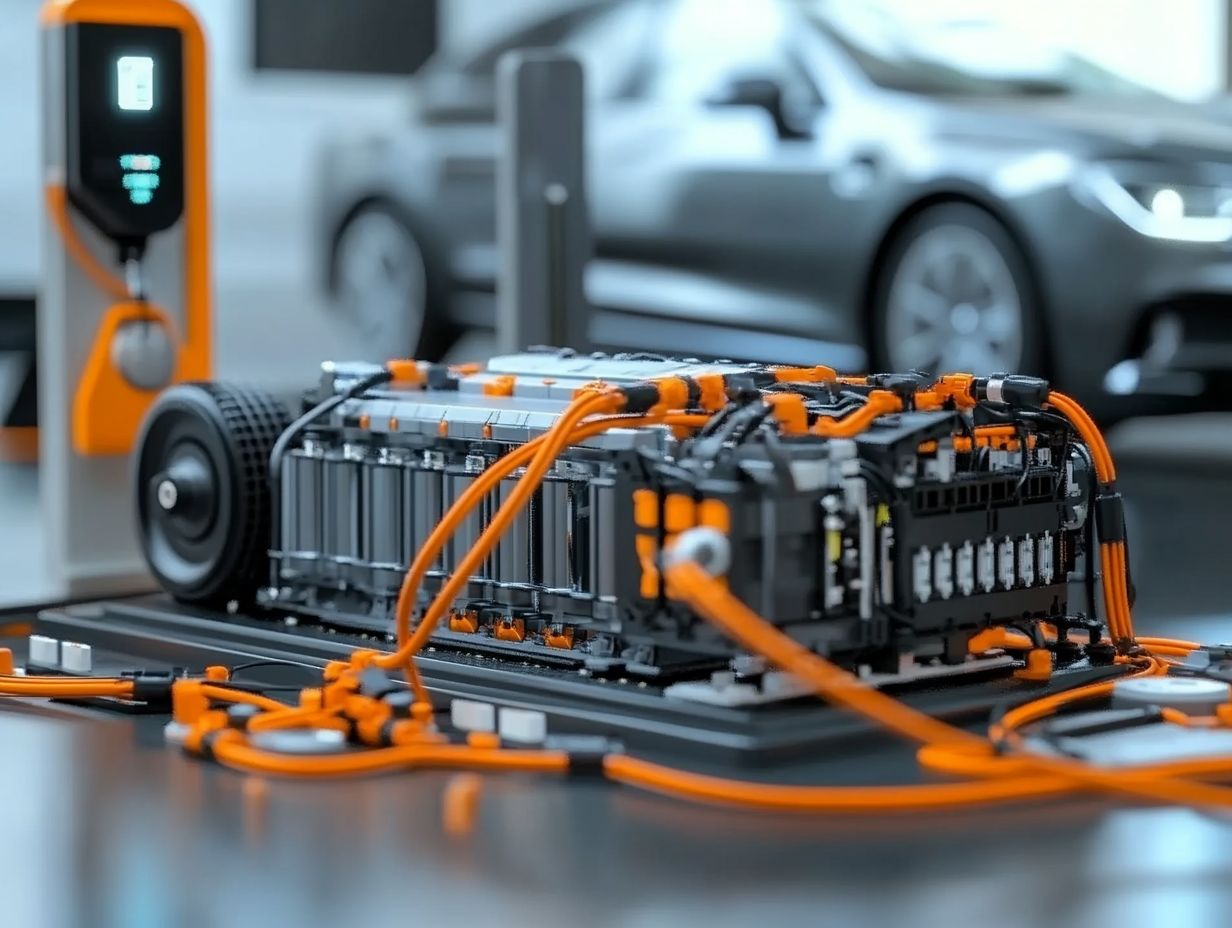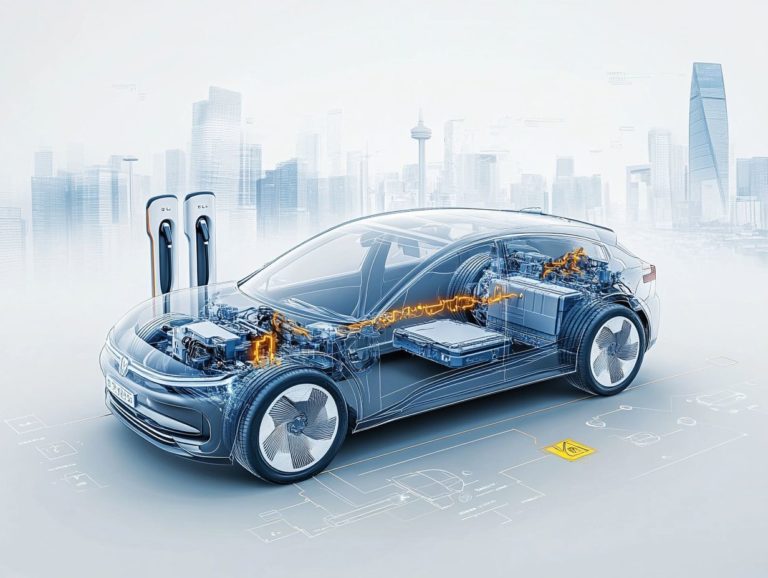What is the Lifespan of an EV Battery?
Electric vehicles (EVs) are swiftly reshaping the automotive landscape, largely due to their eco-friendly technology.
At the core of every EV is its battery, a crucial element that dictates the vehicle’s performance and lifespan.
This article delves into the different types of EV batteries, the factors that influence their longevity, and what you can realistically expect in terms of battery life.
You ll also find practical tips for extending battery life and a discussion on environmentally conscious recycling methods.
Dive in to uncover the must-know facts about EV batteries, and learn how to make the most of them!
Contents
Key Takeaways:

- EV battery lifespan varies depending on factors such as type, usage, and maintenance.
- With proper care, you can expect your EV battery to last between 8 to 10 years. Speed of charging and extreme temperatures can affect lifespan.
- To extend the lifespan of your EV battery, it is important to charge it correctly, avoid extreme temperatures, and follow recommended maintenance guidelines.
Understanding EV Batteries
Understanding EV batteries helps you get the best performance and lifespan from your electric vehicle. These batteries, primarily lithium-ion batteries, power various models like the Chevrolet Bolt and Nissan LEAF.
The chemistry of these batteries plays a crucial role in determining their lifespan and degradation rates. You’ll find that factors such as temperature fluctuations, charge cycles (how many times the battery goes from fully charged to empty and back), and efficient battery management systems are vital for maintaining peak performance.
Advancements in predictive analytics are transforming how manufacturers evaluate battery health and longevity, simplifying your understanding of battery replacement options and warranty coverage.
Types of EV Batteries
There are various types of EV batteries, with lithium-ion batteries taking the spotlight as the most commonly used in electric vehicles such as the Tesla Model S, Hyundai Kona, and Chevrolet Bolt.
These batteries are highly sought after for their impressive energy density, remarkable longevity, and swift charging capabilities, making them the perfect choice for today s electric vehicles. While they can be pricier to produce and may pose challenges when it comes to recycling, they certainly offer numerous advantages.
On the flip side, you have nickel-hydride batteries, found in models like the Toyota Prius. They provide a more budget-friendly option but typically come with lower energy capacity and slower charging times. Despite these limitations, each battery type plays a vital role in the market, impacting vehicle performance, weight, and overall efficiency.
Factors Affecting Battery Lifespan
Battery lifespan can be significantly influenced by a number of factors, including charge cycles, temperature fluctuations, and charging habits that contribute to battery degradation over time.
For instance, the number of complete charge cycles your battery endures has a direct impact on its overall lifespan. Every time it undergoes a full charge and discharge, it experiences a bit of wear and tear.
In practical terms, if you tend to use your device frequently throughout the day, leading to several partial charges rather than full cycles, your battery may actually perform better in the long run.
Extreme temperatures can also accelerate chemical reactions within batteries, posing serious risks. Devices left in scorching hot cars or exposed to frigid temperatures can sustain irreversible damage.
You can boost your battery’s lifespan by using effective management techniques like avoiding overnight charging or utilizing adaptive charging modes. This can significantly mitigate adverse effects and enhance both the longevity and performance of your battery.
Expected Lifespan of EV Batteries

Looking to the future? EV batteries generally last between 8 years or 100,000 miles and up to 10 years or 150,000 miles, depending on the specific vehicle model and battery type.
This range plays a crucial role in informing your battery replacement decisions.
Average Lifespan of Different EV Batteries
EV batteries vary in average lifespan depending on the model you choose. The Hyundai Kona and Chevrolet Bolt are known for their durability. The Tesla Model S stands out for its longevity.
Many drivers report that the Kona can effortlessly reach up to 200,000 miles with minimal degradation. This showcases its remarkable efficiency.
In contrast, analyses indicate that the Chevrolet Bolt’s battery might experience a slight decline after 150,000 miles. Yet, it continues to deliver solid performance well beyond that point.
Numerous users have found that the Tesla Model S often exceeds 300,000 miles while maintaining consistent battery health. This reinforces its status as a top choice for long-lasting EVs.
Reviews consistently highlight that while some models may lag in lifespan, improvements in battery technology are narrowing these gaps. This results in increasingly positive experiences for consumers overall.
Factors That Can Affect Lifespan
Several factors can profoundly influence your EV battery’s lifespan. These include your charging practices, temperature effects, and the specific battery chemistry that affects degradation rates.
For example, frequently opting for fast charging may inadvertently accelerate deterioration. This results in a noticeable decline in your battery’s capacity over time.
Research indicates that consistently charging your EV to 100% and allowing it to drop to near-empty can shorten its lifespan by as much as 30%. Keeping your charge between 20% and 80% enhances both performance and longevity.
Temperature is another crucial factor. Extreme heat can speed up chemical reactions within the battery, while cold temperatures can hinder its performance. Parking your EV in a garage can help mitigate these effects.
Extending the Lifespan of EV Batteries
You can significantly extend the lifespan of EV batteries by implementing effective strategies. This includes adopting optimal charging practices, utilizing advanced battery management systems, and exploring innovative second-life applications for used batteries.
These approaches enhance performance and contribute to sustainability in the electric vehicle landscape.
Tips for Prolonging Battery Life

To effectively prolong battery life, embrace best practices in charging. Avoid extreme temperatures and utilize optimal battery management systems.
These practices enhance the longevity of your batteries and ensure they run at peak efficiency. Charge your devices within a moderate temperature range to prevent irreversible damage.
Take advantage of intelligent battery management systems that monitor and regulate charging cycles. This prevents overcharging and optimizes performance.
By following these recommendations, you can significantly reduce wear on your batteries. This ultimately extends their lifespan and reliability.
Recycling and Disposal of EV Batteries
Recycling and proper disposal of EV batteries are essential for minimizing environmental impact. This ensures the sustainability of battery materials.
When you prioritize these methods, you actively help protect the environment while maximizing the utility of valuable resources.
Environmental Impact and Proper Disposal Methods
The environmental impact of improperly disposed EV batteries can be significant. It is crucial to understand proper disposal methods and effective recycling practices.
When EV batteries end up in landfills, they risk leaking harmful materials like lead and cadmium into the soil and groundwater. This poses serious threats to ecosystems and human health. Engage in responsible disposal practices now to protect the environment!
Support local recycling programs that accept EV batteries. This helps ensure that valuable materials are recovered and harmful chemicals are contained. Educate yourself about designated collection points and government recycling initiatives.
By participating in these sustainable practices, you contribute to a cleaner environment and help mitigate the adverse effects of battery waste.
Frequently Asked Questions
What is the Lifespan of an EV Battery?

The lifespan of an EV battery is the duration it can function at its maximum capacity before needing replacement.
How long do EV batteries typically last?
The average lifespan of an EV battery is around 8-10 years, but this can vary based on usage and maintenance.
What factors can affect the lifespan of an EV battery?
Factors such as temperature, charging habits, and overall usage can affect the lifespan of an EV battery.
Can an EV battery be replaced or repaired?
In most cases, EV batteries can be replaced when they reach the end of their lifespan. However, repairing a battery is usually not cost-effective.
How can I extend the lifespan of my EV battery?
Extend the lifespan of your EV battery by practicing good charging habits, avoiding extreme temperatures, and regularly maintaining your vehicle.
What happens to EV batteries after they are replaced?
After a battery is replaced, it can be recycled and repurposed for other uses, such as energy storage systems.






